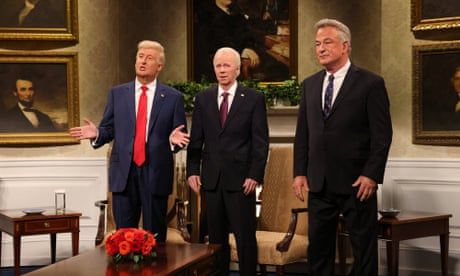
With the election result settling in, comedians and late-night hosts grapple with another four years of an easily ridiculed yet dangerous leader
It’s become an easy and overdone coping mechanism to speak of reality as if it is television. Donald Trump, who gilded his “businessman” reputation on reality television, was the entertainer in chief, a man who built his political career on insult comedy and “just kidding” jokes. His first administration was the show that we were all watching, each frenzied day an increasingly unhinged new episode. After he left office, the unreal spectacle of January 6 lit up television and phone screens for weeks. A second matchup between Trump and Joe Biden was the sequel few wanted, the last-minute swap for Kamala Harris, a briefly invigorating plot twist. And Trump’s victory this month, after a presidential campaign defined more by memes and podcast appearances than traditional media, played out on TV as a muted reboot of 2016.
It’s a sentiment that echoed across late-night comedy, which has struggled for nearly a decade with how to handle Donald Trump and, more broadly, what the mandate for topical TV comedy is in the post-truth, un-reality era. “Reboot culture has gone too far, and I say that as the host of a show that was rebooted,” said the After Midnight host Taylor Tomlinson, now the only full-time female host in late-night, in her monologue the night after the election. “It is an honor to be on television while women are still allowed to be,” she added. On the Late Show the same evening, Stephen Colbert, generally the political average of late-night hosts for the past two terms, was blunter: “Well, fuck. It happened again.”
Continue reading...